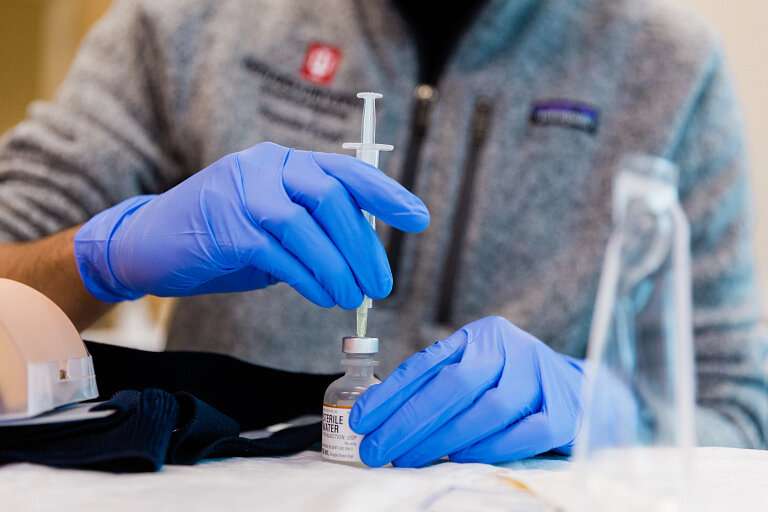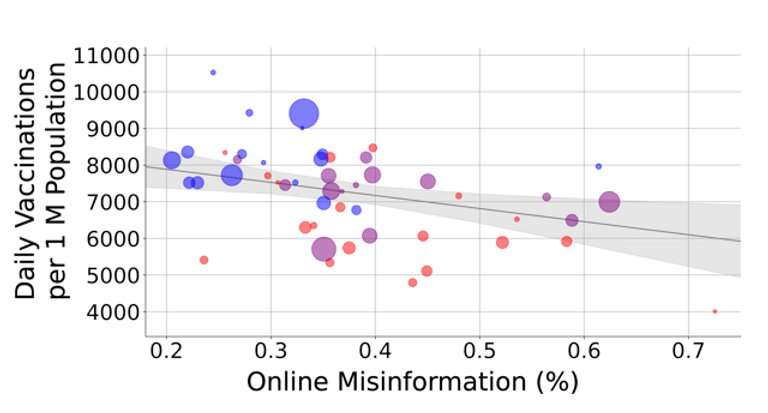Home » Health News »
Study finds COVID-19 misinformation linked to vaccination hesitancy, refusal

Misinformation posted online about the COVID-19 vaccine was associated with hesitancy toward inoculation and lower vaccination rates in some geographical areas of the United States, according to a paper written by a team of researchers from Indiana University’s Observatory on Social Media, known as OSoMe.
“Online misinformation is linked to early COVID-19 vaccination hesitancy and refusal,” published April 26 in the journal Nature Scientific Reports, also found that counties whose residents were more hesitant to receive vaccinations were more likely to have a higher number of Republican voters or Black residents.
The research was a collaboration between OSoMe and the Polytechnic University of Milan in Italy. The researchers studied the relationship between misinformation, behaviors and health outcomes, specifically the way COVID-19 vaccination rates and vaccine hesitancy correlate with levels of misinformation online.
“Misinformation is generally assumed to have a big impact on behavior, but there are few studies that investigate this topic,” said John Bryden, executive director of OSoMe. “We hope this work adds to the picture.”
Bryden said the researchers considered the question of how misinformation affects vaccination behavior after seeing a lot of misinformation posted online during the vaccine rollout and wondering why some states were lagging behind others in vaccination rates.
In 2021, the OSoMe team developed CoVaxxy, a publicly available dashboard, to explore the relationship between misinformation on Twitter and attitudes about COVID-19 vaccines. They used CoVaxxy to collect data from Twitter from Jan. 4 to March 25, 2021. The timeline was chosen because once the vaccine became available to everyone, the issue was no longer supply but demand, said Filippo Menczer, director of OSoMe.
Vaccination has been the key to fighting the SARS-CoV-2 coronavirus, and populations must reach a threshold rate to achieve herd immunity. However, examples of misinformation about the COVID-19 vaccine have included claims that they genetically manipulate the population, or contain microchips that interact with 5G networks, the researchers said in the paper.
Misinformation was identified by considering tweets that contained links to articles from a list of low-credibility sources, as compiled by a politically neutral third party.
The researchers also collected vaccine hesitancy results from surveys posted on Facebook, and obtained state- and county-level vaccination rates from the Centers for Disease Control and Prevention. Vaccine uptake was measured by the number of daily vaccinations in each state from March 19 to 25, 2021, according to CDC measurements.

More than 22 million individual responses to daily surveys on Facebook in February and March 2021 found high levels of vaccine hesitancy, with about 40 to 47 percent of American adults hesitant to take the COVID-19 vaccine, the researchers wrote.
The research found that political partisanship was strongly associated with lower vaccination rates, notably in conservative regions. Republican-majority states and counties showed higher levels of misinformation, greater vaccine hesitancy and lower vaccination rates.
“It was not initially obvious that there would be a connection with politics, but it turned out to be,” Menczer said.
Ethnicity also had a big impact on hesitancy, with Black Americans having a lower vaccination rate. Historical disparities in how Black people and other minorities have been treated in the U.S. health care system compared to white people could have been an additional factor contributing to hesitancy and lower vaccination rates, Menczer said.
The study, for the time period examined, confirmed previous results that linked a number of factors to COVID-19 vaccine hesitancy, the researchers said, with hesitancy rates in the U.S. highest among three groups: African Americans, women and conservatives.
The researchers wrote that the data predict COVID-19 will remain a problem in the U.S., and they explain the importance of combating misinformation.
“While people have a constitutional right to free speech, it is important to maintain an environment where individuals have access to good information that benefits public health,” the researchers said.
Francesco Pierri, the paper’s first author and a post-doctoral researcher in the Department of Electronics, Information and Bioengineering at the Polytechnic University of Milan, was brought into the research as a visiting scholar at OSoMe because of his research on understanding the spread of misinformation, disinformation and digital misbehavior in online social networks.
Source: Read Full Article

